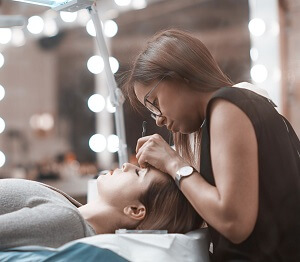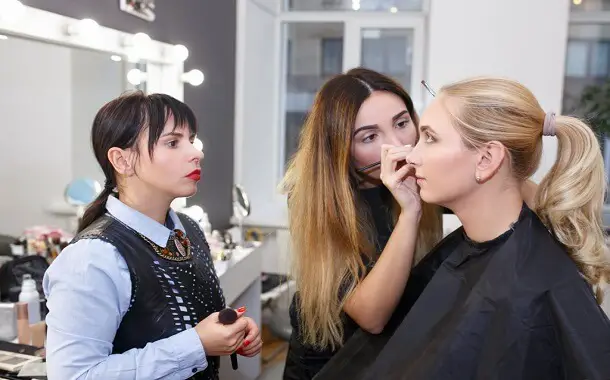How Much Does Cosmetology School Cost?
Last Updated on September 12, 2023
Written by CPA Alec Pow | Content Reviewed by ![]() CFA Alexander Popinker
CFA Alexander Popinker
The cosmetology school cost you will be faced with will depend on a few very important factors, including your state’s requirements for the minimum hours of training before you are licensed, whether the school is known to have any specialization in particular, and your location. Keep in mind that the program fees are just part of the whole cost of cosmetology school, as you should also consider the cost of books, needed supplies, and even housing.
Beauty School Tuition Cost
Tuition fees are bound to be the biggest costs you will be faced with when attending cosmetology school, aside from the necessary living accommodations, but more about this below.
The average cosmetology program cost will be somewhere between $6,500 and $10,000. These price points are just the average, as you can easily spend a lot less or a lot more, depending on several factors. So let’s go over some of the most important ones:
- Whether the courses are in a part-time or a full-time system;
- The minimum number of hours required for the course;
- Whether you will have the needed books and supplies included in the tuition fee;
- Whether it is a school attached to a big brand and whether it is a public school or a private school;
- The exact type of institution, like a college or university, or something else;
- The location of the school.
To give you an idea of the range of costs at different types of schools across the country, check out the following table.
| Cosmetology School in Metro Area | 2021-2022 Tuition Cost |
| Arkansas Beauty School (Arkansas) | $22,775 |
| Aveda Institute (California) | $28,145 |
| Denham Springs Beauty School (Louisiana) | $16,675 |
| French Academy of Cosmetology (Michigan) | $14,225 |
| New England School of Hair Design (New Hampshire) | $19,896 |
| Paul Mitchell (California) | $25,147 |
| Sierra Beauty College (California) | $11,040 |
| Susquehanna County Career and Technology Center (Pennsylvania) | $9,918 |
| Technical College of the Rockies (Colorado) | $8,534 |
| Tennessee College of Applied Technology (Tennessee) | $5,620 |
| Toni & Guy Hairdressing Academy (Texas) | $20,240 |
| UCAS University of Cosmetology Arts & Sciences (Texas) | $16,128 |
| Warrensburg Area Career Center (Missouri) | $6,831 |
As a general rule, schools affiliated with the Aveda Institute or Paul Michell, or other big cosmetics or hairdressing brands, are likely to be the most expensive, especially the ones in the biggest metropolitan areas.
This also means that a community college in a more rural area will also be considerably more affordable. Even so, these parameters are very broad, and just because an institution is located somewhere outside of the urban area, it doesn’t; always mean that the tuition will be below the average.
The good news is that most of these schools will enable you to get financial aid, but this will depend on your specific situation. When browsing through the schools of your choice, you should contact them and see whether they are part of the Title IV program, offering federal financial aid access, and whether incoming students will be able to access any type of scholarship.
Cosmetology School Room and Board
School room and board costs for cosmetology students will be based on your living situation and living expectations. It will be far more costly to move to a new state or even town than continue to live with your family at home for the duration of the courses. The costs of accommodation are pretty large, which is why you should prepare for them in advance.
You might also like our articles on the cost of attending barbering school, nail tech school, or esthetician school.
There are bigger cosmetology schools that offer dorm housing. This is a great way to make friends while spending less on studying away from your home.
 La James College in Mason City, Iowa, is just one example of an institution that has dorm accommodation, although this is only available for female beauty school students. Using their dorms will prove to be the most economical option, far cheaper than any private housing available in the area, as you will only spend around $150 per month for the room itself. This cosmetology college can also offer you a list of apartments that aren’t owned by the school that they can recommend if you don’t want to live on the campus.
La James College in Mason City, Iowa, is just one example of an institution that has dorm accommodation, although this is only available for female beauty school students. Using their dorms will prove to be the most economical option, far cheaper than any private housing available in the area, as you will only spend around $150 per month for the room itself. This cosmetology college can also offer you a list of apartments that aren’t owned by the school that they can recommend if you don’t want to live on the campus.
Of course, cosmetology schools aren’t forced to have dorm rooms, which is why not all of them will have available accommodation options. This is why you might have to consider renting a private apartment or even a room in a private house. This is a cost that will vary across the country quite considerably, with considerably higher smaller costs in smaller towns than in big cities like Los Angeles or New York.
To get an idea about these costs, consider that some of the lowest average rental costs in the country can be found in North Dakota, where you will spend about $850 per month. In high-cost locations like Hawaii, New Jersey, California, or Washington D.C., you are bound to spend $2,500 or more on a one-bedroom apartment.
If you decide to study in Kentucky, Arkansas, or Iowa, you are also in luck, as these three states are among the cheapest when it comes to accommodation, with average prices just under $1,000.
Cost of Cosmetology Student Course Materials, like Books and Supplies
As a cosmetology school student, you will also be required to buy quite a few supplies, among the most important being tools of the trade, beauty equipment, tablets, course books, and more. Below you will find some average costs for cosmetology school supplies:
| School | Average Cost of Books and Supplies |
| Tennessee College of Applied Technology (Nashville, Tennessee) | $1,300 |
| Denham Springs Beauty School (Baton Rouge, Louisiana) | $1,000 |
| Aveda Institute (Los Angeles, California) | $3,100 |
What is the price of the Student Kit for Beauty School?
The cost of a student kit for the beauty school will usually depend on what it will have to be made of and its size and will be somewhere between $1,300 and $2,600.
You will get in your cosmetology student kit everything you will need to practice the cosmetology specialty of your choice. So for example, if you’re taking hairdressing courses, then the student kit required for the Paul Mitchell cosmetology schools will include the following items:
- Books and other reading materials
- Aprons and capes
- Clips, scissors, and shears
- Hot styling tools
- Mannequin heads
- Combs and brushes
Occasional Costs and Fees for Beginning Beauty Professionals
Aside from the costs explained above for course supplies, accommodation, and tuition, there are also other expenses you will be faced with when enrolling at a beauty school. Among the other things you will have to add to your budget when going to a beauty school will be:
- Licensing fees: As soon as the courses are over and you can say you completed cosmetology school, you will have to go through licensing exams before you can actually start working in the field. The fees you will have to pay will depend on the state. California, for example, will have an initial fee for the cosmetology exam of about $125, while Maryland will have a smaller fee of just $25.
- Student kit upgrade: Most student kits are rather generic, having only the basic things required for each type of course, without offering the best equipment you would need. So people that go towards haircutting and not makeup-making will most likely need to invest in scissors of better quality instead of professional makeup brushes.
- Parking costs or public transport: Although pretty cheap as one-time payments, bus or subway tickets, and parking passes will easily add up to become pretty costly, especially in bigger cities.
The final costs will also vary considerably based on whether you work for someone else in a salon or start your own business when you complete your studies.
Sample Budget for Beauty Students
As you’d expect, there are many locational and educational factors that go into determining the cosmetology school cost. Be sure you make a budget as detailed as possible before you enroll at a school, to ensure that you have enough money to finish the courses.
Let’s see an example of the expected budget for someone attending a private beauty school in Michigan, for example:
| Item | Cost |
| Books and Supplies | ~$1,750 |
| Michigan State Cosmetology License | $75 |
| Off-Campus Room and Board | ~$12,000 |
| Tuition and Fees | $12,750 |
| Total Cost of Attending Cosmetology School | ~$27,600 ($2,760/month for 10 months) |
Final Words
As you can see, it surely isn’t cheap to attend beauty school courses, although finishing and getting your license will probably land you a high-paying job, so in the end, it will surely be worth all the budgeting and hard work.


Leave a Reply
Want to join the discussion?Feel free to contribute!